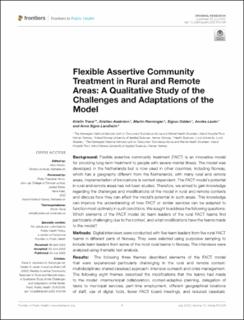| dc.contributor.author | Trane, Kristin | |
| dc.contributor.author | Aasbrenn, Kristian | |
| dc.contributor.author | Rønningen, Martin | |
| dc.contributor.author | Odden, Sigrun | |
| dc.contributor.author | Lexén, Annika | |
| dc.contributor.author | Landheim, Anne Signe | |
| dc.date.accessioned | 2022-11-03T09:27:06Z | |
| dc.date.available | 2022-11-03T09:27:06Z | |
| dc.date.created | 2022-09-01T11:30:50Z | |
| dc.date.issued | 2022 | |
| dc.identifier.citation | Frontiers in Public Health. 2022, 10 1-11. | en_US |
| dc.identifier.issn | 2296-2565 | |
| dc.identifier.uri | https://hdl.handle.net/11250/3029768 | |
| dc.description.abstract | Flexible assertive community treatment (FACT) is an innovative model for providing long-term treatment to people with severe mental illness. The model was developed in the Netherlands but is now used in other countries, including Norway, which has a geography different from the Netherlands, with many rural and remote areas. Implementation of innovations is context dependent. The FACT model’s potential in rural and remote areas has not been studied. Therefore, we aimed to gain knowledge regarding the challenges and modifications of the model in rural and remote contexts and discuss how they can affect the model’s potential in such areas. This knowledge can improve the understanding of how FACT or similar services can be adapted to function most optimally in such conditions. We sought to address the following questions: Which elements of the FACT model do team leaders of the rural FACT teams find particularly challenging due to the context, and what modifications have the teams made to the model. Digital interviews were conducted with five team leaders from five rural FACT teams in different parts of Norway. They were selected using purposive sampling to include team leaders from some of the most rural teams in Norway. The interviews were analysed using thematic text analysis. The following three themes described elements of the FACT model that were experienced particularly challenging in the rural and remote context: multidisciplinary shared caseload approach, intensive outreach, and crisis management. The following eight themes described the modifications that the teams had made to the model: intermunicipal collaboration, context-adaptive planning, delegation of tasks to municipal services, part-time employment, different geographical locations of staff, use of digital tools, fewer FACT board meetings, and reduced caseload. Rural and remote contexts challenge the FACT model’s potential. However, modifications can be made, some of which can be considered innovative modifications that can increase the model’s potential in such areas, while others might move the teams further away from the model. | en_US |
| dc.language.iso | eng | en_US |
| dc.rights | Navngivelse 4.0 Internasjonal | * |
| dc.rights.uri | http://creativecommons.org/licenses/by/4.0/deed.no | * |
| dc.subject | rural | en_US |
| dc.subject | remote | en_US |
| dc.subject | mental health | en_US |
| dc.subject | flexible assertive community treatment (FACT) | en_US |
| dc.subject | innovation | en_US |
| dc.subject | modification | en_US |
| dc.title | Flexible Assertive Community Treatment in Rural and Remote Areas: A Qualitative Study of the Challenges and Adaptations of the Model | en_US |
| dc.type | Peer reviewed | en_US |
| dc.type | Journal article | en_US |
| dc.description.version | publishedVersion | en_US |
| dc.subject.nsi | VDP::Samfunnsvitenskap: 200 | en_US |
| dc.source.pagenumber | 1-11 | en_US |
| dc.source.volume | 10 | en_US |
| dc.source.journal | Frontiers in Public Health | en_US |
| dc.identifier.doi | 10.3389/fpubh.2022.913159 | |
| dc.identifier.cristin | 2047827 | |
| cristin.ispublished | true | |
| cristin.fulltext | original | |
| cristin.qualitycode | 1 | |

